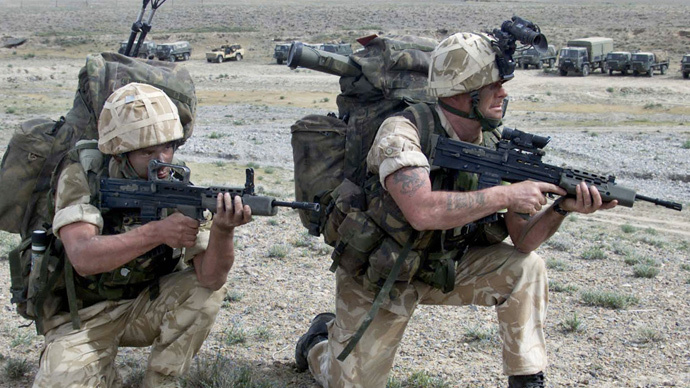‘Drones, spy planes & Special Forces’: Cameron lays out UK war strategy

Covert warfare is progressive, according to Prime Minister David Cameron, who will on Monday unveil plans to ramp up military spending on drones, spy planes and Special Forces operations.
Cameron will visit UK drone base RAF Waddington in Lincolnshire, following Chancellor George Osborne’s recent pledge to peg the UK defense budget at 2 percent of Gross Domestic Product (GDP).
The PM is expected to say he will task defense and security chiefs to examine how Britain can do more “to counter the threat posed by ISIL [Islamic State] and Islamist extremism.”
“This could include more spy planes, drones and special forces. In the last five years, I have seen just how vital these assets are in keeping us safe,” he will say.
This trend of using drones and engaging in Special Forces operations has grown steadily in recent years - largely as a result of Britain’s military operations in Iraq and Afghanistan.
BBC News - 'Spend on more on drones and SAS' - David Cameron (video) http://t.co/2Vd4xJbF45
— Drone Wars (@Drone_Wars_UK) July 13, 2015
RT asked Chris Cole of Drone Wars UK on Monday about the rationale behind what he termed “remote warfare.”
“The use of drones, special forces and private security companies has become the favored means of military interventions as the public has grown increasingly war-weary,” he said.
Cole said that public outrage over dead and wounded soldiers has changed the face of warfare in Britain.
He argued the “political cost” of warfare can be whitewashed in incidences where the state employs “remote systems” like drones.
“If you take away that potential political cost by using remote systems like drones, it much easier for our politicians to be seen to be doing something as it is perceived as ‘risk free’,” he said.
Cole stressed the use of drones is not a humanitarian pursuit. The appearance of diminished risk is an illusion, he said.
“Rather we are transferring the risk of war from our troops, on to the heads of innocent civilians on the ground in the countries we are bombing, and also on to our civilians who have become the targets for reprisals,” he added.
Further expansion of the drone war? US seeks new drone base in N Africa, according to @WSJhttp://t.co/q32smbbAto (£)
— Reprieve (@Reprieve) July 13, 2015
Cole’s view appears to be in line with some the Ministry of Defence’s (MoD) own internal discussions.
In September 2013, following a Freedom of Information (FoI) request by the Guardian newspaper, it was revealed that an internal MoD discussion paper had argued that less overt forms of warfare would be required to pursue British strategic aims.
The report by the MoD’s Development, Concepts and Doctrine Centre (DCDC), suggested that the armed forces try to "reduce public sensitivity to the penalties inherent in military operations.”
It said the ministry should "inculcate an attitude that service may involve sacrifice and that such risks are knowingly and willingly undertaken as a matter of professional judgment."
The paper added that the use of drones and mercenaries - which it called “contractors” - were less likely to lead to a public outcry in the face of bloody battles.
UK's PM to make speech today from 'Reaper' base, calling for more spending on drones - our comment here: http://t.co/3ZKXeZW9EC
— Reprieve (@Reprieve) July 13, 2015
The report also cited the case of a group of Special Forces killed in 1982, saying that “the loss of 19 SAS soldiers in a single aircraft accident during the Falklands campaign did not arouse any significant comment."
Asked what the specific impacts of extended Unmanned Aerial Vehicle (UAV) warfare could be, Cole said, “Increased drone and air strikes are bound to increase civilian casualties.”
“Observers report that between 500 and 1,000 civilians have already died in coalition bombing in Iraq and Syria and if the number of strikes increase this will only rise.”












